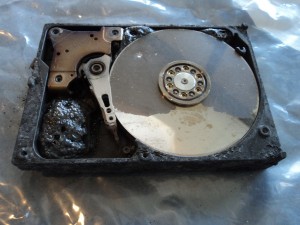Smoke can damage a hard drive, but only in extreme circumstances.
Hard drives have pouch filters that prevent most contaminants from reaching the platters (discs coated in a thin layer of magnetic material, which store the user’s data).
Nearly all modern hard drives have two permanent filters:
- The recirculating filter, which filters small particles of magnetic media removed from the platters during normal operation.
- The barometric filter, which filters external particles and prevents them from reaching the platters.
Contrary to popular belief, most hard drives do not have air-tight enclosures. The barometric filter plays an important role in protecting the platters from contaminants.
Most hard drives can run in extremely dirty environments without suffering damage (although dust and other contaminants can cause other issues with the electronics or prevent a computer from dissipating heat, potentially causing an early failure).
Hard drive filters aren’t perfect, and smoke may cause data loss.
When contaminants are extremely small — or when the hard drive is exposed to airborne contaminants for extended periods of time — contaminants may bypass the filters.
This can occur due to structural fires. In other words, if you smoke cigarettes around your computer, you’re probably not damaging the hard drive, though tobacco smoke may eventually damage other electronic components.

Platters of a burned hard drive.
But structural fires create plenty of airborne contaminants, and some of those particles may make their way inside the hard drive’s enclosure.
When smoke contaminants reach the platters, they may cause extensive damage. The hard drive’s read/write heads float a small distance from the platters on a cushion of air; if the heads encounter a contaminant, they may come into contact with the platters.
That can lead to rotational scoring, which occurs when the heads remove the magnetic material from the platters. When the magnetic material is removed, the data is unrecoverable.
Fortunately, modern hard drives are engineered to prevent this from happening — but in extreme circumstances, data loss can still occur.
Preventing Data Loss Due to Smoke Damage
When we receive a fire-damaged hard drive, we immediately evaluate the device to determine whether the platters are permanently damaged. We also use proprietary techniques to clean the drive in a certified cleanroom.
Most permanent data loss occurs when a user continues to operate a hard drive after a failure. If your computer was near a fire or if you see signs of heat damage, do not operate it. Running the hard drive — even for a few seconds — may cause permanent data loss.
Take the following steps:
- Keep the computer powered off. Unplug the computer from the wall.
- If you’re comfortable removing the hard drive, ground yourself first to prevent electrostatic damage. Do not attempt to clean the hard drive.
- If you’re not comfortable removing the hard drive, ship the entire computer to a professional data recovery laboratory.
- Package hard drives in an anti-static bag or plastic bag, then surround the drive with a sufficient amount of bubble wrap (at least 3-5 inches). Do not use packing peanuts.
- Seek professional assistance as soon as possible. Corrosion and other issues can exacerbate damage, so prompt treatment is essential.
Datarecovery.com provides emergency data recovery services for fire- and flood-damaged hard drives. We provide discounted services for victims of natural disasters, such as the August 2023 Hawaiian wildfires.
With free evaluations and our no data, no charge guarantee, we provide a reliable, cost-effective solution for data loss. To learn more, call 1-800-237-4200 or submit a case online.





